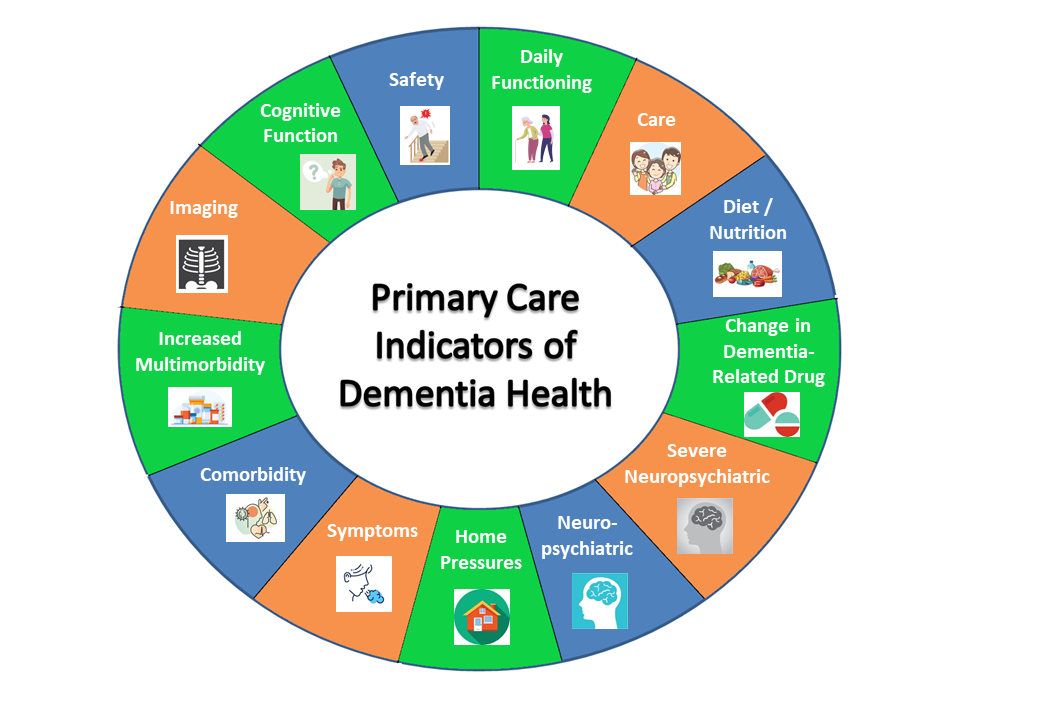Linked studies
A systematic review of prognostic factors and inequalities in poor outcome in people with dementia
Study team:
Michelle Marshall1, Joanne L Jordan1, Ram Bajpai1, Danielle Nimmons2, Tilli M Smith1, Paul Campbell1,3, Kelvin Jordan1
1 Keele University, 2 University College London, 3 Midlands Partnership NHS Foundation Trust
Aim
To identify factors from published studies that have previously been examined for poor outcomes in people living with dementia that predict faster cognitive decline, care home admission and need for palliative care. The review particularly focused on factors that could be assessed in primary care medical records.
Results
After structured and organised searches were undertaken, 46 studies were included in our review. We found 21 studies that investigated 94 factors that might lead to earlier care home admission. There were 26 papers that investigated 60 factors that might lead to a faster deterioration in memory (cognition). Only 1 paper investigated 13 factors that might lead to a need for earlier palliative care.
11 factors that were associated with an increased risk of care home admission and 4 factors that were associated with an increased risk of memory getting worse (cognitive decline) (see Table 1).
Table 1. Factors associated with each outcome
Care home admission |
Increased risk | No increased risk | Inconsistent evidence | Limited evidence |
Older age Less deprived Living alone White race Urban residence Worse cognition at baseline Taking dementia medication Depression Psychosis/psychotic symptoms Wandering Caregiver desire for admission | BMI/weight Self-reported general health Aggression Agitation Mental health (composite) Cancer Respiratory disease Musculoskeletal disease Polypharmacy Bowel incontinence Hearing loss Urinary incontinence Visual impairment Caregiver mental health Caregiver residence | Sex Education Marital status Activities of daily living Mobility Type of dementia Behaviour change Hospitalisation No. of comorbidities Cardiovascular disease Cerebrovascular disease (inc stroke/TIA) Diabetes Frailty Currently receives care Caregiver age Caregiver sex Caregiver physical health Caregiver relationship | 50 factors examined by a single study |
Cognitive decline |
Increased risk | No increased risk | Inconsistent evidence | Limited evidence |
Longer duration of dementia Agitation/aggression Psychosis/psychotic symptoms Hypercholesterolaemia | Self-reported general health No. of comorbidities Hypertension Cerebrovascular disease (inc stroke/TIA) Depression/anxiety/ irritability Smoking | Age Sex Education Cardiovascular disease Diabetes Antihypertensive medication Cognition at baseline Type of dementia | 42 factors examined by a single study |
We discussed our results with caregivers of people living with dementia, healthcare professionals and dementia researchers to find out if our findings made sense and if they felt there were any factors that were missing, that might be important. They recommended further investigation of 22 additional potential factors (see Table 2).
Table 2. Caregivers, clinicians & researchers' views on factors they felt were missing
Caregiver additional factors suggested | Clinician/researcher additional factors suggested |
Bereavement | Bereavement |
Continuity of care within primary care | Continuity of care within primary care |
Change in living environment/residence | Change in living environment/residence |
Build-up of number of factors | Build-up of number of factors |
When factor developed in course of dementia | When factor developed in course of dementia |
Time to diagnosis | Dysinhibition |
Caregiver info/knowledge received about dementia | Increase in number of home visits |
Distance from relatives/caregivers | Power of attorney |
Physical fighting/violence | Dietary supplements |
Advocacy, people to support/fight for the person living with dementia | Oral health (including thrush) |
| | Referral for imaging |
Conclusion
Examining the evidence for factors that might indicate poor outcomes in people living with dementia is challenging. We found evidence that several factors measurable in primary care healthcare records could alert healthcare professionals to the risk of a faster disease progression.
A number of additional factors were suggested as possibly being important by our caregiver and stakeholder groups, they need further investigation. Also, we found that inequalities may exist in who gets admitted into a care home.
Dissemination and contact information
PROSPERO database:
Marshall M, Jordan J, Nimmons D, Jordan K. Systematic review of prognostic factors and inequalities in poor outcome in people with dementia. PROSPERO 2022 CRD42022338436.
Available from: www.crd.york.ac.uk/prospero/display_record.php?RecordID=338436
Journal articles:
Marshall M, Jordan JL, Bajpai R, Nimmons D, Smith TM, Campbell P, Jordan KP. (2024) Systematic review of prognostic factors for poor outcome in people living with dementia that can be determined from primary care medical records. BMC Geriatr; 24: 801. doi: 10.1186/s12877-024-05389-0
PubMed: https://pmc.ncbi.nlm.nih.gov/articles/PMC11443862/
Full text: https://pmc.ncbi.nlm.nih.gov/articles/PMC11443862/pdf/12877_2024_Article_5389.pdf
Conference presentations:
- Cochrane Colloquium, London, September 2023
Jordan JL, Archer L, Bajpai R, Marshall M, Wynne-Jones G, Jordan KP, van der Windt D. Designing and delivering prognostic factor systematic reviews: challenges and solutions. Cochrane Colloquium 2023 – Poster presentation.
- NIHR SPCR showcase, London, September 2023
Marshall M, Jordan JL, Bajpai RC, Nimmons D, Smith T, Campbell P, Jordan KP. Systematic review of prognostic factors for cognitive decline, care home admission and palliative care in people living with dementia. NIHR School for Primary Care (SPCR) Showcase 2023 – Oral presentation.
- 17th UK Dementia Congress, Birmingham, November 2023
Marshall M, Jordan JL, Bajpai RC, Nimmons D, Smith T, Campbell P, Jordan KP. Systematic review of prognostic factors for cognitive decline, care home admission and palliative care in people living with dementia. 17th UK Dementia Conference 2023 – Poster presentation.
Contact information
Principal Investigators: Dr Michelle Marshall m.marshall@keele.ac.uk & Professor Kelvin Jordan k.p.jordan@keele.ac.uk



